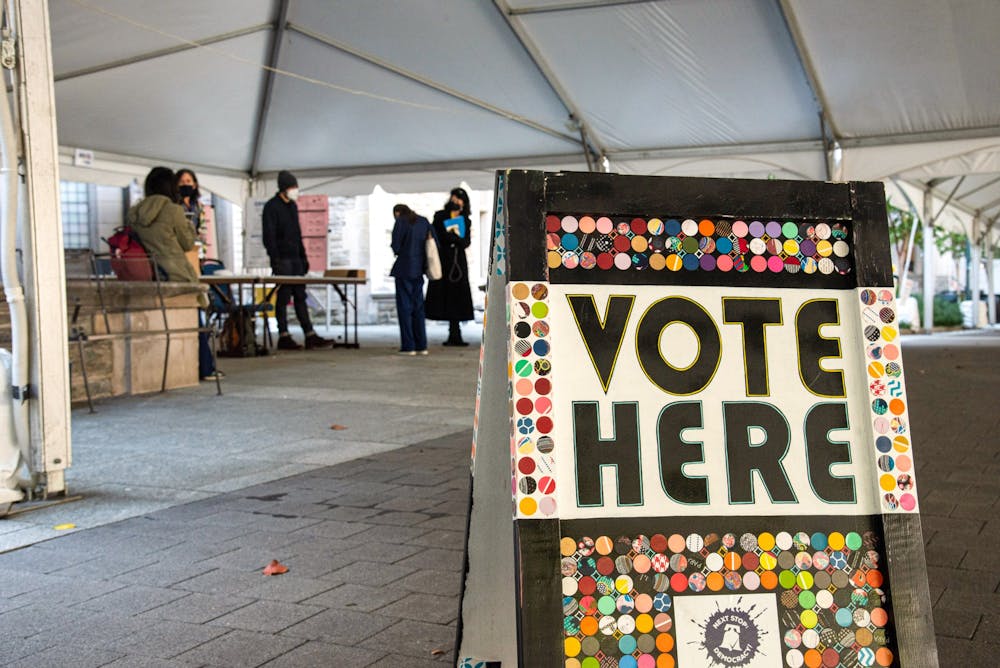For decades, young people — many of whom have never engaged in the political process — historically exhibit the lowest voter turnout rates compared to their older counterparts. Luckily, such statistics are changing in light of social movements. But to continue such a crucial incline in engagement, the young cohort must cast their ballots, and midterm elections are no exception.
Believe it or not, deciding not to vote is standard for many eligible Americans. Even in the momentous 2020 election, only half of eligible 18-24 year olds enacted their civic duty.
“When you don’t have a seat at the table, you’re on the menu,” Shannon Watts, voting advocate and founder of Moms Demand Action, warned young Penn students at "Students for Shapiro’s Darty for Democracy" last weekend.
Since the 2020 election, over eight million people aged 18 and older are now eligible to vote. This sizable increase can generate monumental effects in the midterm elections, and upend politics as a voting bloc. That is, if they actually turnout.
Those who don’t vote are hardly a monolith: There are multiple factors that influence whether a citizen chooses to vote or abstain, and so there are various camps of deliberate nonvoters.
We have all heard the self-defeating falsehood, “my singular vote can’t swing an election,” which, though understandable, could not be further from the truth. Collective groups actively choose not to vote under this belief, but razor-thin elections are often skewed by individual voter margins, most distinctly seen in local elections. Nonvoters dramatically influence political outcomes, too.
When I spoke to Watts, she attested, “I have been in almost a dozen states in the last month. When I talk to candidates and lawmakers, often they say that they won by a handful of votes, sometimes as few as 50.” Such a minor amount of votes is the difference in how policies will be enacted or terminated. Thus, when 50 people choose not to vote because they feel their voices are inconsequential to an election, they play a role in forestalling positive change, or even propelling laws against their values.
Secondarily, some actively choose not to vote because of their convictions surrounding the significance of voting itself. But voting is pivotal in societal flourishing and governmental functionality. When viewed in the context of political participation, voting is just one act of democratic contribution. More importantly, it can also serve as a habitual pathway toward other forms of civic engagement with contentious issues.
SEE MORE FROM RIANE LUMER:
Voting can redefine the future. So when positioned in society with the capability to enact your vote, the “I’m too lazy to vote” card is not only unjustified, but also poses immense repercussions for those not permitted to. We have to be a voice for the silenced and afflicted. Laziness isn’t an option.
Granted, voter suppression laws and voter purges inflict profound obstacles for eligible voters in exercising their fundamental right, specifically for minority groups who lack representation. There are multiple barriers preventing eligible voters from flocking to the polls: for example, polling closures, long lines, and reduced voting hours. In Georgia, it is considered a crime to provide food and water to those waiting in line to vote. But for those not experiencing such burdens, such as Penn students, you can make time to vote. With mail-in ballots as an option, voting has been made easier in avoiding electoral chaos.
There are also those who maintain that political affiliation or interest is not part of their self-expression. But I find this not to be a plausible excuse. We are all responsible for bettering our society; if not for ourselves, then for others — especially for those who can’t. Despite our diverging orientations in society, we are bound by networks of relationships and are obligated to act as political agents within our enmeshed, interdependent ties. Apathy is a privilege that many can’t afford to endure while democracy is at stake.
“There’s always going to be someone who will cancel your vote out. What matters is that we are showing up and voting for our principles, and you have to do that every single election,” Watts insisted.
During Josh Shapiro’s speech in Clark Park last weekend, he asserted, “It’s not nice that you’re participating, it’s necessary. Gen Z is leading the way on [some] of the most important issues of our time … you have the power and responsibility to make a difference.”
A Harvard youth poll showed that most young Americans believe that the rights of others as well as their own are under attack today. Additionally, it found that “youth turnout in the 2022 midterm elections is on track to match — or potentially exceed — 2018’s historic level of participation.” I implore you to engage in this turnout as the youth mind can render systemic change.
Currently, the Senate is split 50-50 across party lines with Vice President Kamala Harris' tie-breaking vote. Only one seat could shift control. Thus, these midterm elections are a make-or-break race for both parties in achieving a majority.
Those who decide to opt out of voting are inconsiderate to the powerless who can’t vote in the first place. Remember, ethics are up and down the ballot. “Our safety is on the line, and we have to fight for it,” as Watts said. Both action and inaction can be historic — show up.
RIANE LUMER is a College junior studying political science and journalistic writing from Huntingdon Valley, Pa. Her email address is rlumer@sas.upenn.edu.









